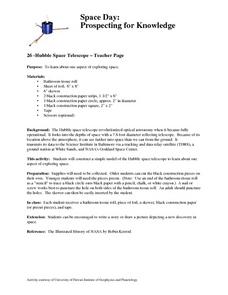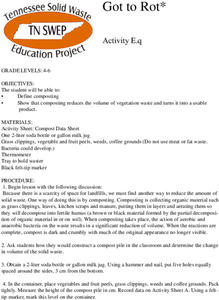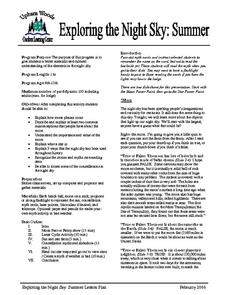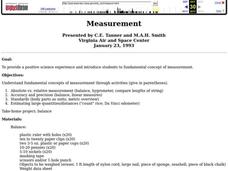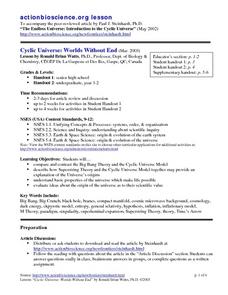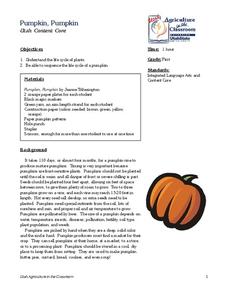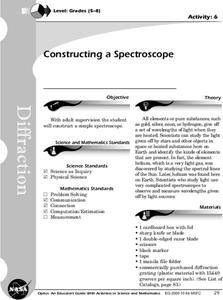Curated OER
The Future of the Milky Way
Students brainstorm ideas about the future of our galaxy. In this space science lesson, students research the three main events happening in the Milky Way. They write a report about their findings.
Curated OER
BOUNCING INFORMATION AROUND
Students examine how satellite signals are sent and duplicate it with a mirror, flashlight and black paper.
Curated OER
Stargazing Astronomy: A Ceiling Full of Stars
Students make an observe a planetarium using a can with nail holes, black paper and a flashlight.
Curated OER
Constellations
Third graders investigate space by researching their zodiac signs. In this space science activity, 3rd graders discuss the different zodiac symbols, their star representation and where the stars are located in the sky. Students create...
Curated OER
Spacd Day:Probing For Knowledge
Students investigate the uses and purpose of the Hubble telescope. They create a model of the telescope and conduct research about the history behind the invention of it. Students use the information in order to create a context for the...
Curated OER
Got to Rot
Learners make their own compost in a 2-liter jug and determine the actual volume loss in the composted material over a six-month period.
Curated OER
Exploring the Night Sky: Summer
Young scholars explain how moon phases occur. They describe and explain at least two common misconceptions that people have about the moon. Students explain what a star is. They explain 3 ways that the night sky has been used throughout...
Curated OER
Measurement
Middle schoolers experience a positive science experiment and study fundamental concepts of measurement.
Curated OER
Cyclic Universe: Worlds Without End
Students compare and contrast the Big Bang Theory and the Cyclic Universe Model. They explain basic properties of the univers which make life possible. They evaluate ideas about the origin of the universe as to their scientific value.
Curated OER
Exploring the Night Sky: Fall/Winter
Learners explain how moon phases occur. They explain three ways that the night sky has been used through history. Students locate some of the constellations in the night sky. They discuss stories and myths surrounding stars.
Curated OER
Pumpkin, Pumpkin
First graders understand that pumpkins grow slowly over several months. In this pumpkin lesson plan, 1st graders listen to the book Pumpkin, Pumpkin and recall the sequence of the pumpkin life cycle. Students create pumpkin artwork...
Curated OER
A Journey of Discovery with RXTE
Students complete different missions to examine the topic of x-ray sources. They use satellite images and websites to gather the information they need to complete the lesson. They complete a worksheet to end the lesson.
Curated OER
How Does Light Travel?
Sixth graders are read The Way to Start a Day by Byrd Baylor or Bear Shadow by Frank Asch. They discuss how the sun affects their daily life, 6th graders are encouraged to think about the light we recieve from the sun and how man has...
Curated OER
The Appearance of the Moon
Third graders watch a demonstration on how craters were formed on the moon. Individually, they care given a set of materials that represent the moon surface and make their own craters. To end the lesson, they measure the size of the...
Curated OER
Analytical Spectroscope
Pupils using a spectroscope view different substances when heated with electricity.
Curated OER
Constructing a Spectroscope
Students construct a simple spectroscope. They observe the emission spectrum produce by a source of light.






